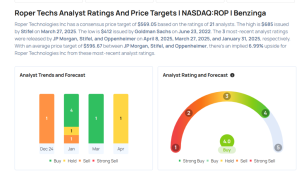
Highlighted on September 30, it was unveiled in an SEC filing that Edwards, SVP at Cracker Barrel Old CBRL, executed a significant transaction involving the exercise of company stock options.
What Happened: The latest Form 4 filing on Monday with the U.S. Securities and Exchange Commission uncovered Edwards, SVP at Cracker Barrel Old, exercising stock options for 0 shares of CBRL. The total transaction was valued at $0.
As of Tuesday morning, Cracker Barrel Old shares are down by 0.68%, with a current price of $45.04. This implies that Edwards’s 0 shares have a value of $0.
Delving into Cracker Barrel Old’s Background
Cracker Barrel Old Country Store Inc operates hundreds of full-service restaurants throughout the United States. Its restaurants are open for breakfast, lunch, and dinner, with menus that offer home-style country food. Cracker Barrel’s biggest input costs are beef, dairy, fruits and vegetables, pork, and poultry. The company purchases its food products from a few different vendors on a cost-plus basis. All restaurants are located in freestanding buildings and include gift shops, which contribute roughly one fourth of total company revenue. Apparel and accessories are the company’s biggest revenue generators in the retail segment of the business.
Financial Milestones: Cracker Barrel Old’s Journey
Positive Revenue Trend: Examining Cracker Barrel Old’s financials over 3 months reveals a positive narrative. The company achieved a noteworthy revenue growth rate of 6.89% as of 31 July, 2024, showcasing a substantial increase in top-line earnings. As compared to competitors, the company encountered difficulties, with a growth rate lower than the average among peers in the Consumer Discretionary sector.
Exploring Profitability:
-
Gross Margin: Achieving a high gross margin of 32.1%, the company performs well in terms of cost management and profitability within its sector.
-
Earnings per Share (EPS): The company excels with an EPS that surpasses the industry average. With a current EPS of 0.82, Cracker Barrel Old showcases strong earnings per share.
Debt Management: The company maintains a balanced debt approach with a debt-to-equity ratio below industry norms, standing at 2.73.
Valuation Metrics: A Closer Look
-
Price to Earnings (P/E) Ratio: With a lower-than-average P/E ratio of 24.78, the stock indicates an attractive valuation, potentially presenting a buying opportunity.
-
Price to Sales (P/S) Ratio: The Price to Sales ratio is 0.29, which is lower than the industry average. This suggests a possible undervaluation based on sales performance.
-
EV/EBITDA Analysis (Enterprise Value to its Earnings Before Interest, Taxes, Depreciation & Amortization): The company’s EV/EBITDA ratio 12.96 is below the industry average, indicating that it may be relatively undervalued compared to peers.
Market Capitalization Analysis: Below industry benchmarks, the company’s market capitalization reflects a smaller scale relative to peers. This could be attributed to factors such as growth expectations or operational capacity.
Now trade stocks online commission free with Charles Schwab, a trusted and complete investment firm.
Understanding the Significance of Insider Transactions
Emphasizing the importance of a comprehensive approach, considering insider transactions is valuable, but it’s crucial to evaluate them in conjunction with other investment factors.
Exploring the legal landscape, an “insider” is defined as any officer, director, or beneficial owner holding more than ten percent of a company’s equity securities, as stipulated by Section 12 of the Securities Exchange Act of 1934. This encompasses executives in the c-suite and major hedge funds. These insiders are required to report their transactions through a Form 4 filing, which must be submitted within two business days of the transaction.
Highlighted by a company insider’s new purchase, there’s a positive anticipation for the stock to rise.
But, insider sells may not necessarily indicate a bearish view and can be motivated by various factors.
The Insider’s Guide to Important Transaction Codes
Delving into transactions, investors typically prioritize those unfolding in the open market, as precisely outlined in Table I of the Form 4 filing. A P in Box 3 indicates a purchase, while S signifies a sale. Transaction code C signals the conversion of an option, and transaction code A denotes a grant, award, or other acquisition of securities from the company.
Check Out The Full List Of Cracker Barrel Old’s Insider Trades.
Insider Buying Alert: Profit from C-Suite Moves
Benzinga Edge reveals every insider trade in real-time. Don’t miss the next big stock move driven by insider confidence. Unlock this ultimate sentiment indicator now. Click here for access.
This article was generated by Benzinga’s automated content engine and reviewed by an editor.
Market News and Data brought to you by Benzinga APIs
© 2024 Benzinga.com. Benzinga does not provide investment advice. All rights reserved.


